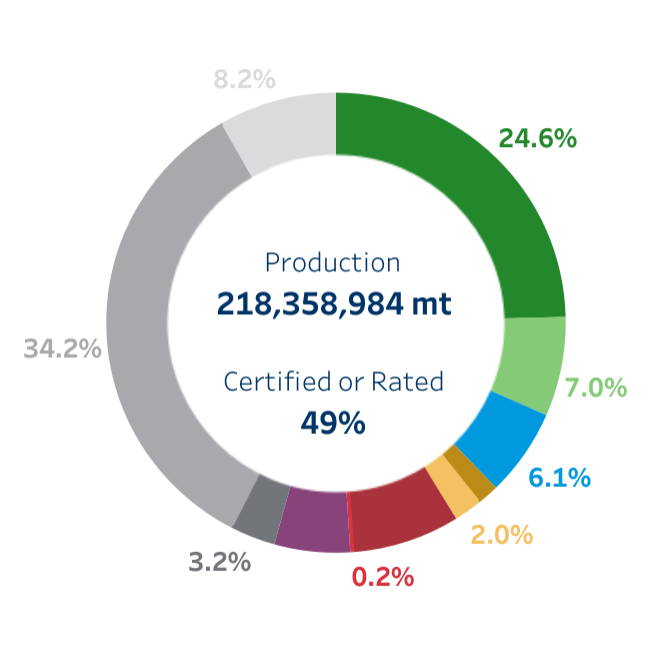The Certification and Ratings Collaboration recently completed our third update to the Environmental Data Tool (our fourth year of data). We are pleased to announce a 10% increase in the coverage of certifications and ratings compared to when the tool first launched in 2020.
New this year are data from the Qingdao Marine Conservation Society (QMCS), whose ratings of Chinese seafood production helped bring cover of certifications and ratings to almost half – 49.1% – of global production. And coverage increases to almost 55% if you include Fishery Improvement Projects (FIPs) and Aquaculture Improvement Projects (AIPs).
Of course, this does not mean that half of global seafood production is sustainable, but it provides an updated snapshot of current environmental performance – to the best of our knowledge, the most comprehensive high-level assessment available. It also allows sustainability-minded businesses, NGOs, governments and international bodies, and other stakeholders to monitor progress towards better environmental performance and identify areas where improvements should be prioritized.

In addition to incorporating QMCS’s data, Collaboration members (ASC, FTUSA, MBA, MSC and SFP) and collaborating organizations (GSA’s BAP program and QMCS) have all been working to improve the scope of their programs:
ASC: In 2022, ASC certified farms sites increased by 22%, delivering an additional 14% in ASC labeled products to consumers worldwide. Additionally, over 1,000 small-scale farms have now earned ASC certification for responsibly farmed seafood through ASC’s group certification. In September 2023, ASC launched its framework for credible Aquaculture Improvements Projects (AIPs) under the Improver Programme by ASC, with seafood leader Thai Union committing to be one of the first partners to implement ASC’s AIPs. Following the launch, ASC is now celebrating the first shrimp farm – PT. Koyo Segoro Endah (KSE) in Indonesia – achieving certification after participating in ASC’s pilot AIP.
<b style="text-align: var(--text-align);">FTUSA:</b> FTUSA added 2 new certified wild capture fisheries (Mexican octopus, Brazilian arapaima) and 2 new certified aquaculture farms (Thai and Vietnamese shrimp).
MBA: Over the past 12 months, Monterey Bay Aquarium Seafood Watch has completed 49 assessments, culminating in 224 ratings which cover almost 11M mt of seafood. Some assessments reflected improving performance (such as: Giant tiger prawn from Vietnam farmed in extensive ponds and silvoculture was upgraded to Good Alternative) and some were downgraded to reflect new risks (such as some US and Canadian Atlantic pot, trap and gillnet fisheries due to their interactions with the endangered North Atlantic Right Whale).
MSC: In the last year, MSC saw an increase of global wild capture seafood engaged in the MSC program at 19%, representing over 15 million tons of seafood. There are now 670 fisheries engaged in the MSC program, spanning 66 countries. In addition, 17 fisheries are in-transition to MSC representing potential future certified fisheries. These data demonstrate that sustainability is important to global fisheries, the supply chain and consumers. More in the latest MSC annual report.
SFP: In the past year, over 20 new FIPs were launched, spanning diverse seafood sectors such as tuna, squid, and shrimp, and contributing an additional 400,000 tonnes to capture production. Noteworthy mentions include recent large-volume FIPs such as the Southwest Atlantic Argentine shortfin squid – jig (TSSFA), Argentina hake – bottom trawl, and Eastern Pacific Ocean bigeye and skipjack tuna – purse seine (TUNACONS) FIPs, each addressing fisheries that are highly significant to their respective regions and seafood sectors.
GSA: The Global Seafood Alliance supports the responsible development of the small-scale farmers and fishers within the seafood sector. As part of this effort in 2023, the organization participated in a sub-group mangrove shrimp farming certification pilot with Minh Phu in Cà Mau, Vietnam. GSA is proud to report that the Dat Mui sub-groups of Minh Phu improved their aquaculture practices while maintaining forestry area regulations and attained Best Aquaculture Practices (BAP) certification across 380 sub group farms with oversight from 11 groups producing over 300 MT of black tiger shrimp.
QMCS: QMCS is the newest collaborating organization to share their seafood production data with the Collaboration and added ratings for 20M mt of production from China – the world’s largest seafood producer. To increase transparency and accountability, QMCS continues to update the standards and seafood assessments on their website.
The Collaboration also launched a social data tool in September, which compiles human rights abuses and risks data on 92 seafood producing countries. For each country, it summarizes: 1) Evidence of forced labor, human trafficking, and/or child labor in fishing, aquaculture and seafood processing, and 2) Risk factors for human rights abuses in seafood – flag of convenience, EU red or yellow cards for IUU fishing, and failure to ratify key international conventions and treaties pertaining to human rights.
© 2024, ALL RIGHTS RESERVED. POLÍTICA DE PRIVACIDAD